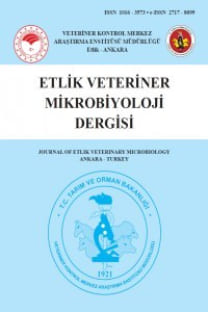Kanatlı Hayvan İmmün Sistemi Üzerine Antibakteriyel İlaçların Etkileri
Etlik veteriner Mikrobiyoloji Dergisi, Antibakteriyel ilaç, Kanatlı Hayvanlar, Aşılama, İmmün Sistem, Etkileşme
The Effects of Antibacterial Drugs on Immune System of Poultry
___
- Allan WH and Gough RE (1974). A standart haemagglutination inhibition test for Newcastle diease. (1) A comparison of macro and micro methods. Vet Rec , 95, 120- 123
- Anderson R (1985) . The effects of antibiotics and drug associations including antibiotics on immunodefence system. In: Newman, W. Useful and harmful interaction of antibiotics. Boca Raton, Florida, CRC Press.
- Arda M (1976) Hollanda'da Newcastle hastalığı üzerinde çalışmalar ve HI testinin yeni yönteme göre değerlendirilmesi. Vet H ek Derg, 46, 19- 28.
- Aruillommi H Vouri M and Sal mi A (197 6). Sulfamethoxazoletrimetoprim: Effect on antibody responce in man. Chemothera. 22, 37- 42.
- Aucoin DP (1996). Intracelluar- Intraphagocytic dynamics of fluoroquinolone antibiotics: A comparative review. Supl Compen Contin Educ Pract Vet, 18,9- 13
- Back O and Norberg B (1984) The effect of a therapeutic doxycycline concentration on polymorphonuclear leucocyte migratian in vitro. Scand J Infect Dis, 16, 369- 372.
- Bailly S Michile F, et bougerot- Pocidalo MA (1990). Effect des quinolones sur la production de TNF parle monocytes humains . Path Biol, 38,267-271.
- Barry AL and Fuchs PC (1993). Selection of a fluoroquinolone class disc for susceptibility tests. Amer J Med, 94 (Suppl. 3 A), 17S- 22S .
- Blalock TL, Thaxton JP and Garlich JD (1984) . Humoral immunity in chicks experiencing marginal vitamin B-6 deficiency . J Nutr, 114, 312- 322.
- Bodur S (1993). Antibiyotiklerin immün sistem üzerine olan etkileri. ANKEM Derg., 7., 161- 163.
- Bowen J M (1983). Immunotoxicity of antibiotics. Clin Pharmacol Note, 35,4-5 .
- Böck P (1989). Romeis mikroskopische technik. 17 Aufl . Urban und Schwarzenberg. München.
- Burgaleta C and Moreno T (1987). Effect of B- lactams and aminoglycosides on human polymorphonuclear leucocytes . J Antimicrob Chemother, 20 529- 535.
- Dofwang II, Cook ME and Sunde ML (1987). Interaction of dietary antibiotic supplementation and stocking density on broiler chick performance and immun responce. Br Poult Sci, 28,47- 55.
- Düzgüneş O, Kesici T ve Gürbüz F (1993). İstatislik Metodları, II. Baskı, AÜZF Yayınları, Yayın No: ı29ı .' Ders Kitabı No: 86ı, A Ü Basımevi, Ankara.
- Ellerbroek L (1991) . Zum mikrobioıogischen Nachweis der chinolon carbonsaeurederivate Enrofloxacin, Ciprofloxacin und Flumequin. Fleischwirtsch, 71 187-189.
- Gemmell CG (1993). Antibiotics and neutrophil function potential immunomodulating activities . J Antimikrob Chemother. 3ı (Supp. B): 23- 33.
- Gismondo MR, Chisari G and Lo Bue AM (1991). Effect of ampicillin and sulbactam/ampicillin on the immune system . J Int Med Res 19 (Suppl 1), 24A- 28A.
- Kılıçturgay K (1993) İmmun modulatör olarak antibiyotikler. ANKEM Derg, 7, 157-160.
- Lagrange PH (1990). Mecanismes physikopathologiques de I'infektion bacterienne et antibiotiques path Biol, 38, 239- 241 .
- Nicoletti P, Mason RM and Tehrani J (1987). Antibodies in calves on feed supplemented with chlortetracycline after vaccination with Bruceila abortus strain ı9 . JAVMA, 190, 1002- 1003 .
- Roche Y, Fay M and Gonhgerot M (1988) Enhancement of interleukin- 2 production by quinolone- treated human mononuclear leucocytes .Int J Immunopharmac 10, 161- 167.
- Sunshine I (197 5). Methodology for analytical toxicology .V ol 1. Printed in the United States .
- Şanh Y ve Kaya S (1994). Veteriner İlaç Rehberi ve Uygulamalı Bilgiler El Kitabı, Medisan Yayınevi, Yayın No, 16, Ankara.
- Van Rensburg CE, Joone G and Anderson R (1990). Interactions of the oxygen-dependent antimicrobial system of the human neutrophil with difloxacin, ciprofloxacin, pefloxacin and fleroxocin in the intraphagocytic eradication of J. Aureus J Med Microbiol, 32, 15-17.
- ISSN: 1016-3573
- Yayın Aralığı: Yılda 2 Sayı
- Başlangıç: 1960
- Yayıncı: Veteriner Kontrol Merkez Araştırma Enstitüsü Müdürlüğü
Atlarda Leptospirozisin Seroprevalansı
Cengiz ÇETİN, Mihriban ÜLGEN, Vildan ÖZDEMİR, Kamil Seyrek İNTAŞ
Kanatlı Hayvan İmmün Sistemi Üzerine Antibakteriyel İlaçların Etkileri
Yusuf ŞANLI, Hakan YARDIMCI, Mehmet AKAN, Reşat AŞTI, Nevin KURTDEDE, Ali BİLGİLİ, Ayhan FİLAZİ
Muhabbet Kuşu (Melopsittacus undulatus) ve Kanaryalarda (Serin us canaria) Megabakteriosis
Kuzu Pnömonileri Üzerinde Mikrobiyolojik ve Histopatolojik İncelemeler
Mihriban ÜLGEN, Gürsel SÖNMEZ, Fulya AYDIN
Yavuz Selim SAĞLAM, Hüdaverdi ERER
SAMSUN YÖRESİ SIGIR VE KOYUNLARlNDA GÖRÜLEN MERA KENELERİ VE MEVSİMSEL DAĞILIŞLARI
Bursa'da Sığır ve Koyunlarda Mavi Dil İnfeksiyonunun Seroprevalansı
Mihriban ÜLGEN, Ayhan AKÇORA, Levent KOCABIYIK
Tavuklarda (Gallus Gallus Var. Domesticus)Megabakteriyel Proventriculitis
Ö.faruk MUTLU, Selda SEÇKİN, Rıfkı HAZIROĞLU
